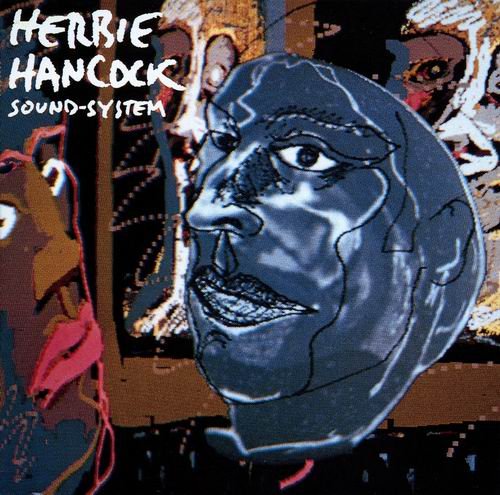
Herbie Hancock - Sound-System (1984)
BAND/ARTIST: Herbie Hancock
- Title: Sound-System
- Year Of Release: 1984
- Label: Sony Records[SRCS 9509]
- Genre: Soul Jazz, Fusion, Electro Funk
- Quality: FLAC (image + .cue,log,scans)
- Total Time: 33:54
- Total Size: 270 MB(+3%)
- WebSite: Album Preview
Tracklist
1. Hardrock [6:10]
2. Metal Beat [4:56]
3. Karabali [5:17]
4. Junku [5:32]
5. People Are Changing [6:05]
6. Sound-System [5:53]
personnel:
Herbie Hancock - Fairlight CMI, Rhodes Chroma, Apple IIe, Yamaha DX-7, E-mu 4060 Digital Keyboard, Piano, Memorymoog, Clavinet
Bill Laswell - Bass, DMX, Tapes
D.St. - Turntables
Nicky Skopelitis - Guitar
Henry Kaiser - Guitar
Daniel Ponce - Bata
Anton Fier - Simmons Drums, Sound Plates, Cuica, Cymbals, Gongs, TR-808, Wood Block, Percussion, Synare, Tympani
Rob Stevens - XMD, Praxis Processing
Will Alexander - Fairlight CMI, Programming
Foday Musa Suso - Dusunguni, Balaphone, Kora, Kalimba, Guitar, Talking Drum
Wayne Shorter - Lyricon, Soprano Sax
Toshinori Kondo - Speaker, Trumpet
Aiyb Dieng - Talking Drum, Chatan, Bells, Don Don, Cowbell
Bernard Fowler - Voice, Vocals, Vocal Arrangement
Hamid Drake - Cymbals
Re-Mastering Engineer: Kouji Suzuki, Chiaki Ikematsu
When Herbie Hancock's Sound System was released in 1984, critics slammed it as a commercially driven, derivative follow-up to Future Shock and its hit single "Rockit." Hancock's jazz audience, on the other hand, just slammed it, period. Remastered with one bonus remix and an unrevealing interview with producer Bill Laswell, this reissue offers the chance to listen to Sound System outside of its original 1980s context and reveals it as a more interesting release than was given credit at the time. Critics certainly had a point when they called Sound System a rip-off of its predecessor. The opening "Hardrock" in particular sounds like a conscious attempt at duplicating "Rockit," from its electronic drum programming to its synthesizer melody and turntable scratching. But elsewhere on the album, Hancock and Laswell's crew of conspirators (which include many of the same musicians involved in the latter's experimental Material albums from the same period) get into areas that are more far-reaching than anything on Future Shock. The most welcome addition is West African harpist Foday Musa Suso, whose beautiful kora and balophone textures inject "Metal Beat," "Junku," and the title track with world-fusion flavors. There's also Wayne Shorter, whose lyricon (a cousin of the soprano saxophone) graces "Metal Beat" and "Karabali," and percussionist Ayb Dieng, whose talking drum serves to enhance Laswell's industrial-tinged production. --Ezra Gale
1. Hardrock [6:10]
2. Metal Beat [4:56]
3. Karabali [5:17]
4. Junku [5:32]
5. People Are Changing [6:05]
6. Sound-System [5:53]
personnel:
Herbie Hancock - Fairlight CMI, Rhodes Chroma, Apple IIe, Yamaha DX-7, E-mu 4060 Digital Keyboard, Piano, Memorymoog, Clavinet
Bill Laswell - Bass, DMX, Tapes
D.St. - Turntables
Nicky Skopelitis - Guitar
Henry Kaiser - Guitar
Daniel Ponce - Bata
Anton Fier - Simmons Drums, Sound Plates, Cuica, Cymbals, Gongs, TR-808, Wood Block, Percussion, Synare, Tympani
Rob Stevens - XMD, Praxis Processing
Will Alexander - Fairlight CMI, Programming
Foday Musa Suso - Dusunguni, Balaphone, Kora, Kalimba, Guitar, Talking Drum
Wayne Shorter - Lyricon, Soprano Sax
Toshinori Kondo - Speaker, Trumpet
Aiyb Dieng - Talking Drum, Chatan, Bells, Don Don, Cowbell
Bernard Fowler - Voice, Vocals, Vocal Arrangement
Hamid Drake - Cymbals
Re-Mastering Engineer: Kouji Suzuki, Chiaki Ikematsu
When Herbie Hancock's Sound System was released in 1984, critics slammed it as a commercially driven, derivative follow-up to Future Shock and its hit single "Rockit." Hancock's jazz audience, on the other hand, just slammed it, period. Remastered with one bonus remix and an unrevealing interview with producer Bill Laswell, this reissue offers the chance to listen to Sound System outside of its original 1980s context and reveals it as a more interesting release than was given credit at the time. Critics certainly had a point when they called Sound System a rip-off of its predecessor. The opening "Hardrock" in particular sounds like a conscious attempt at duplicating "Rockit," from its electronic drum programming to its synthesizer melody and turntable scratching. But elsewhere on the album, Hancock and Laswell's crew of conspirators (which include many of the same musicians involved in the latter's experimental Material albums from the same period) get into areas that are more far-reaching than anything on Future Shock. The most welcome addition is West African harpist Foday Musa Suso, whose beautiful kora and balophone textures inject "Metal Beat," "Junku," and the title track with world-fusion flavors. There's also Wayne Shorter, whose lyricon (a cousin of the soprano saxophone) graces "Metal Beat" and "Karabali," and percussionist Ayb Dieng, whose talking drum serves to enhance Laswell's industrial-tinged production. --Ezra Gale
Jazz | Music | Soul | Funk | FLAC / APE | CD-Rip
As a ISRA.CLOUD's PREMIUM member you will have the following benefits:
- Unlimited high speed downloads
- Download directly without waiting time
- Unlimited parallel downloads
- Support for download accelerators
- No advertising
- Resume broken downloads



